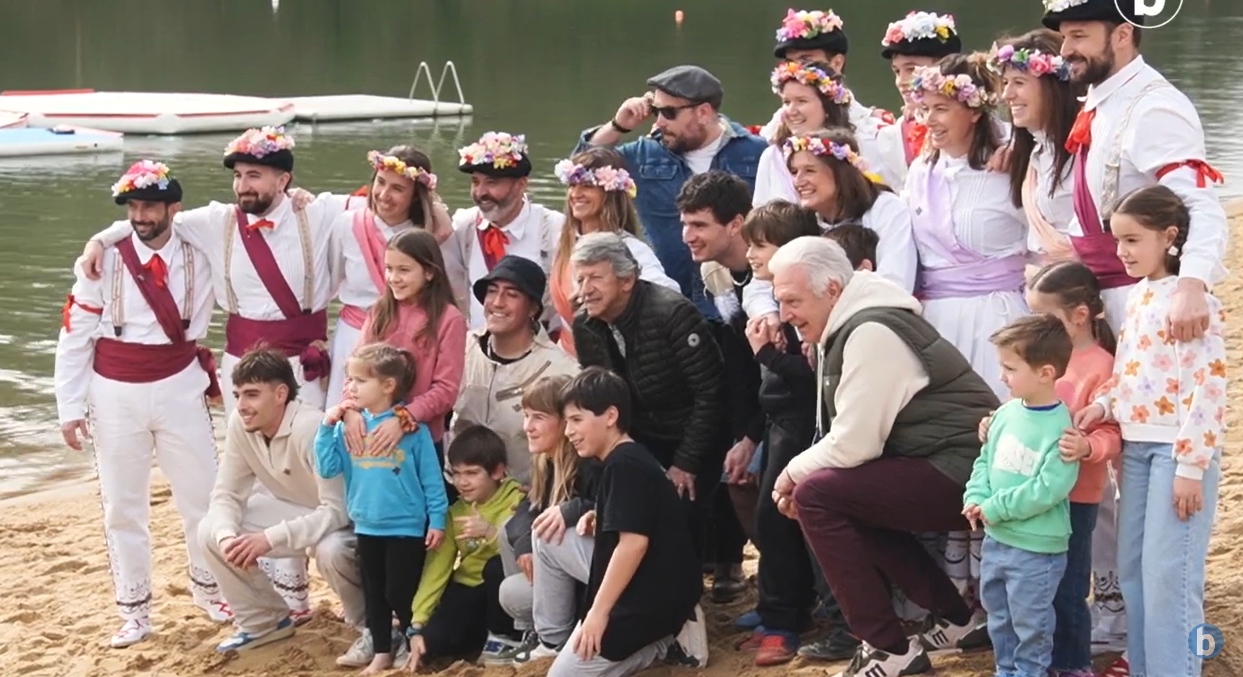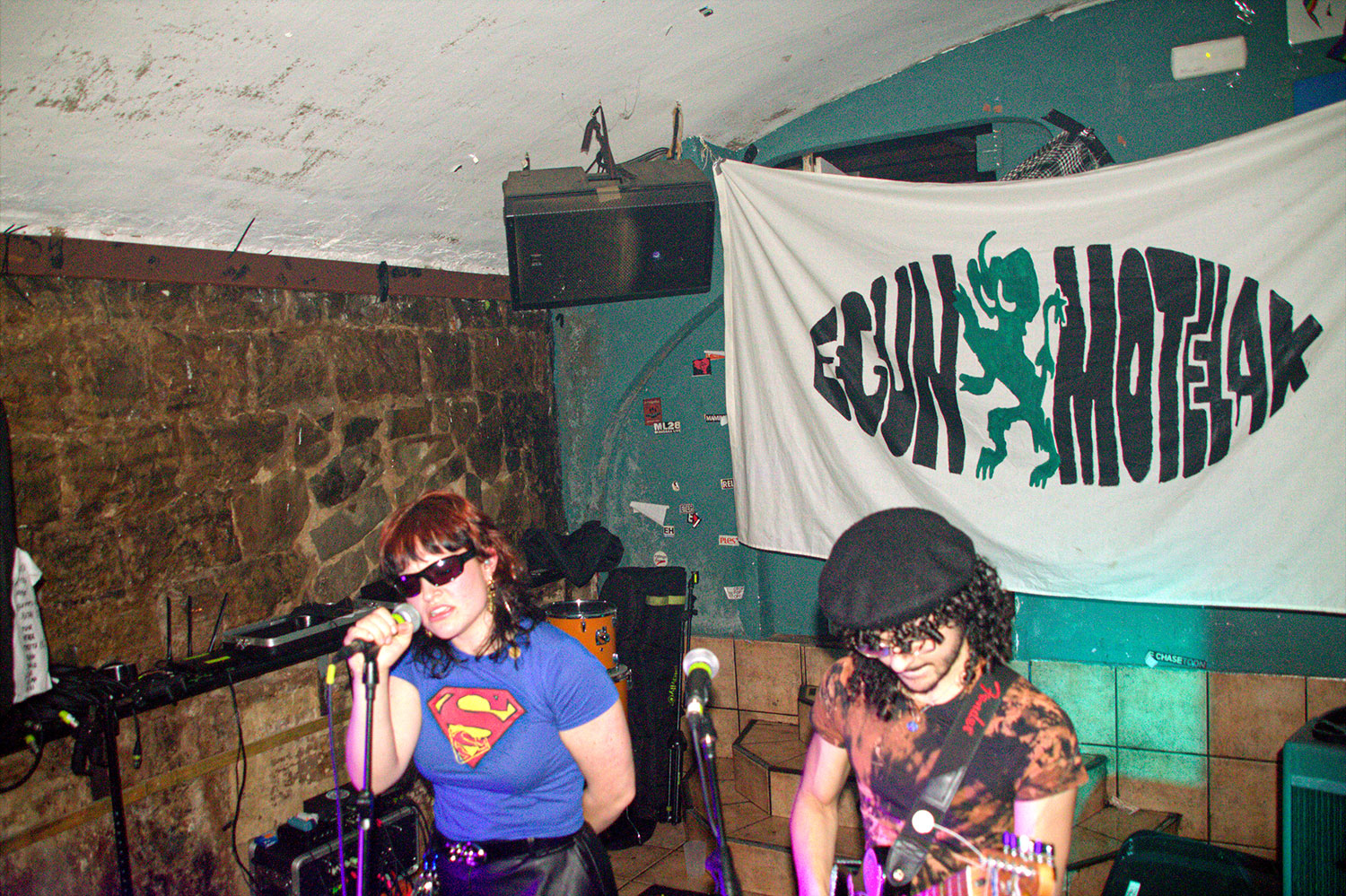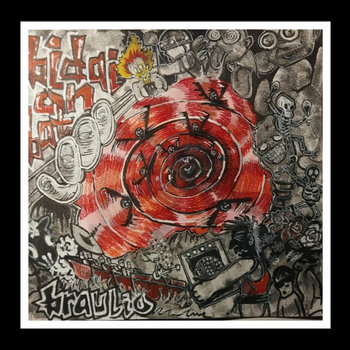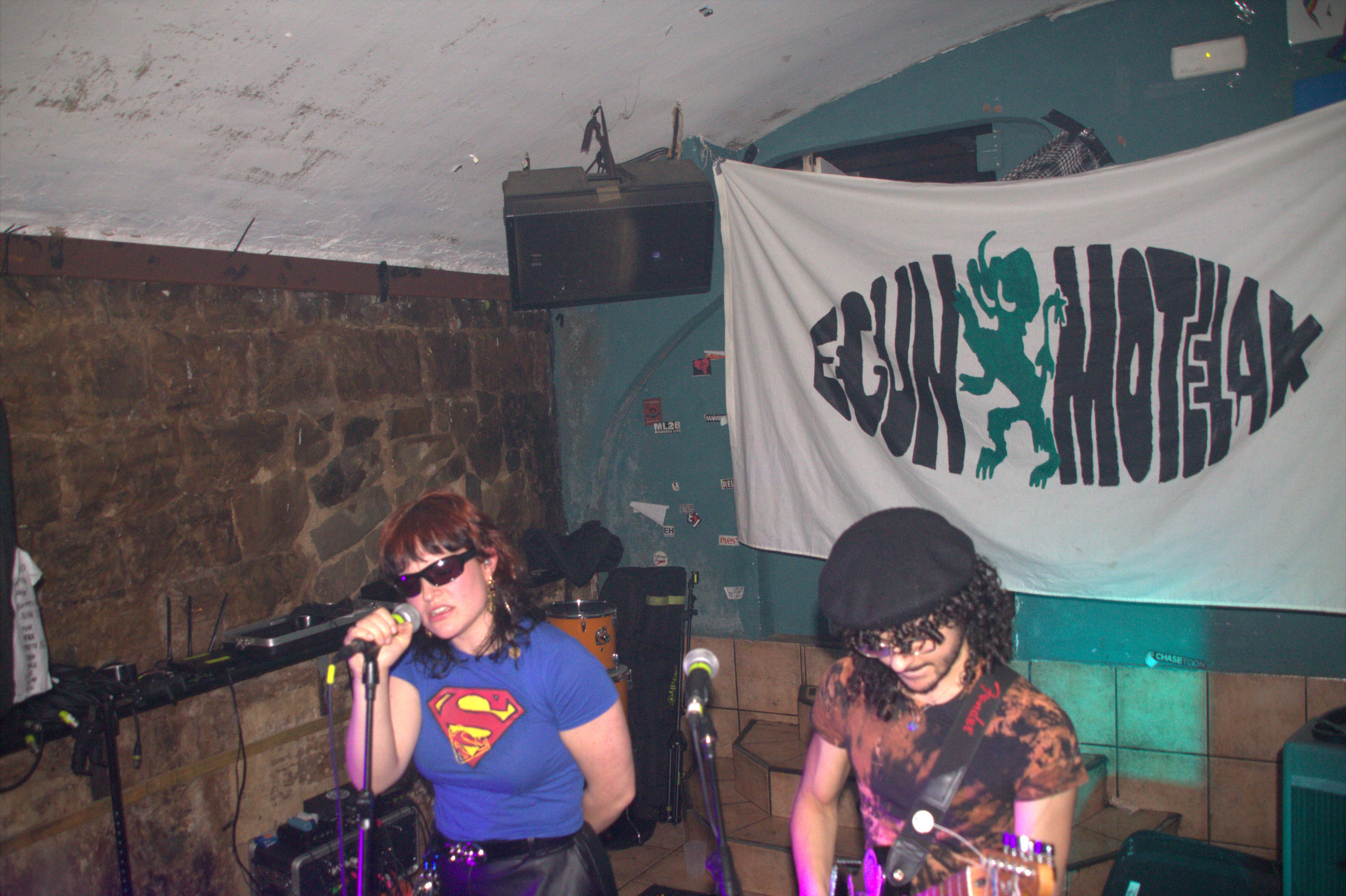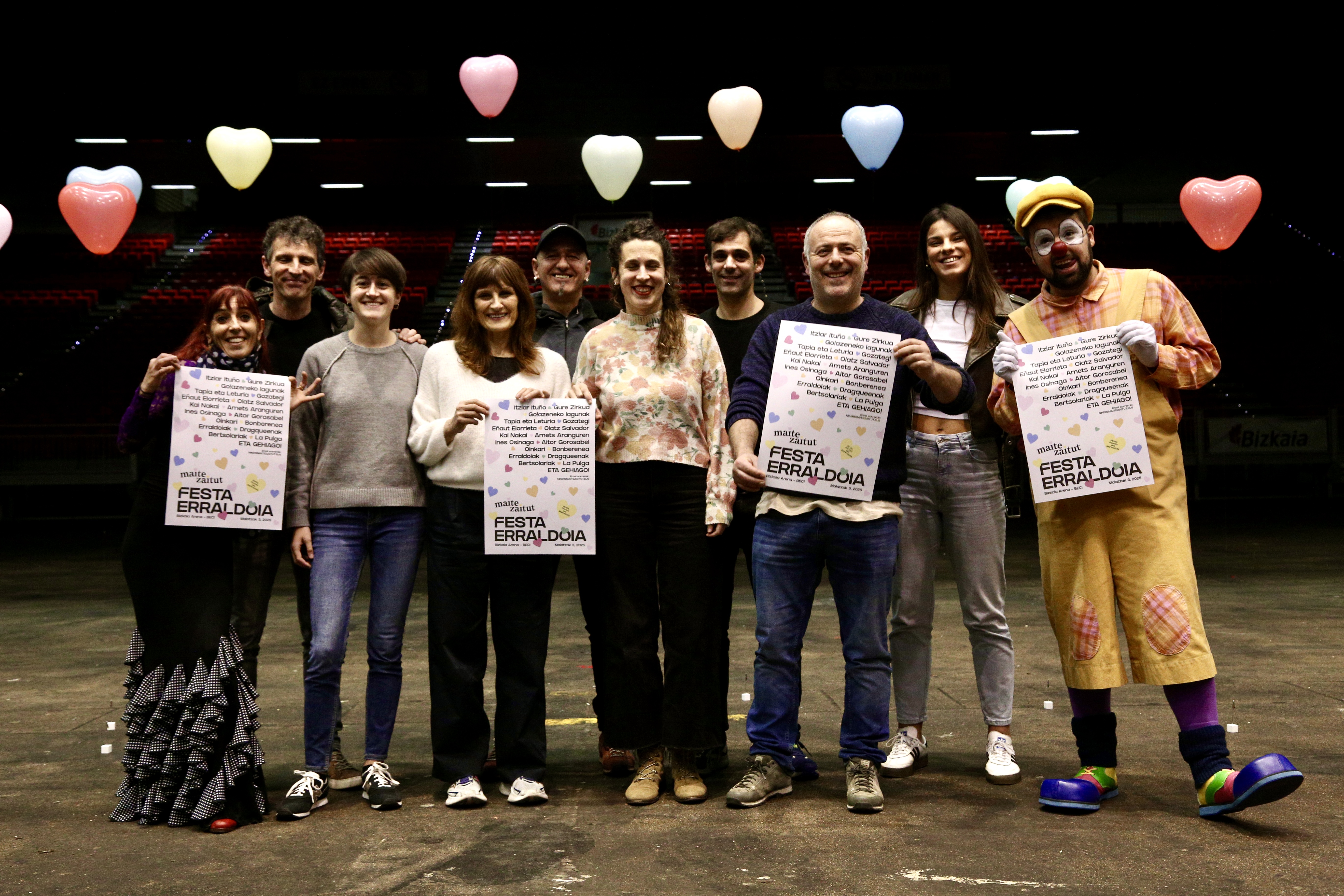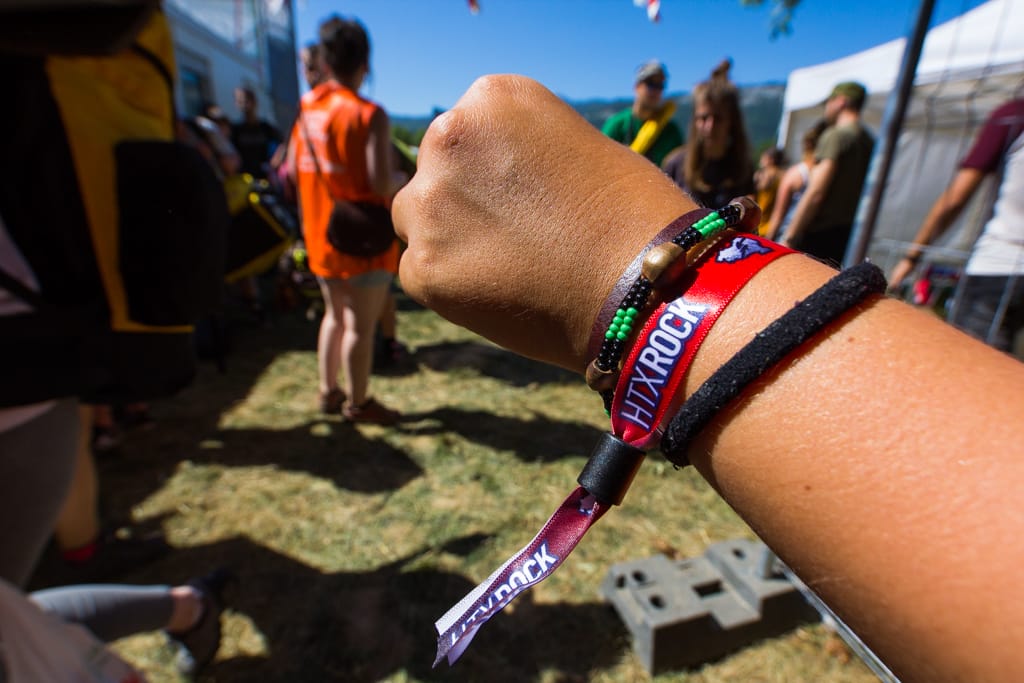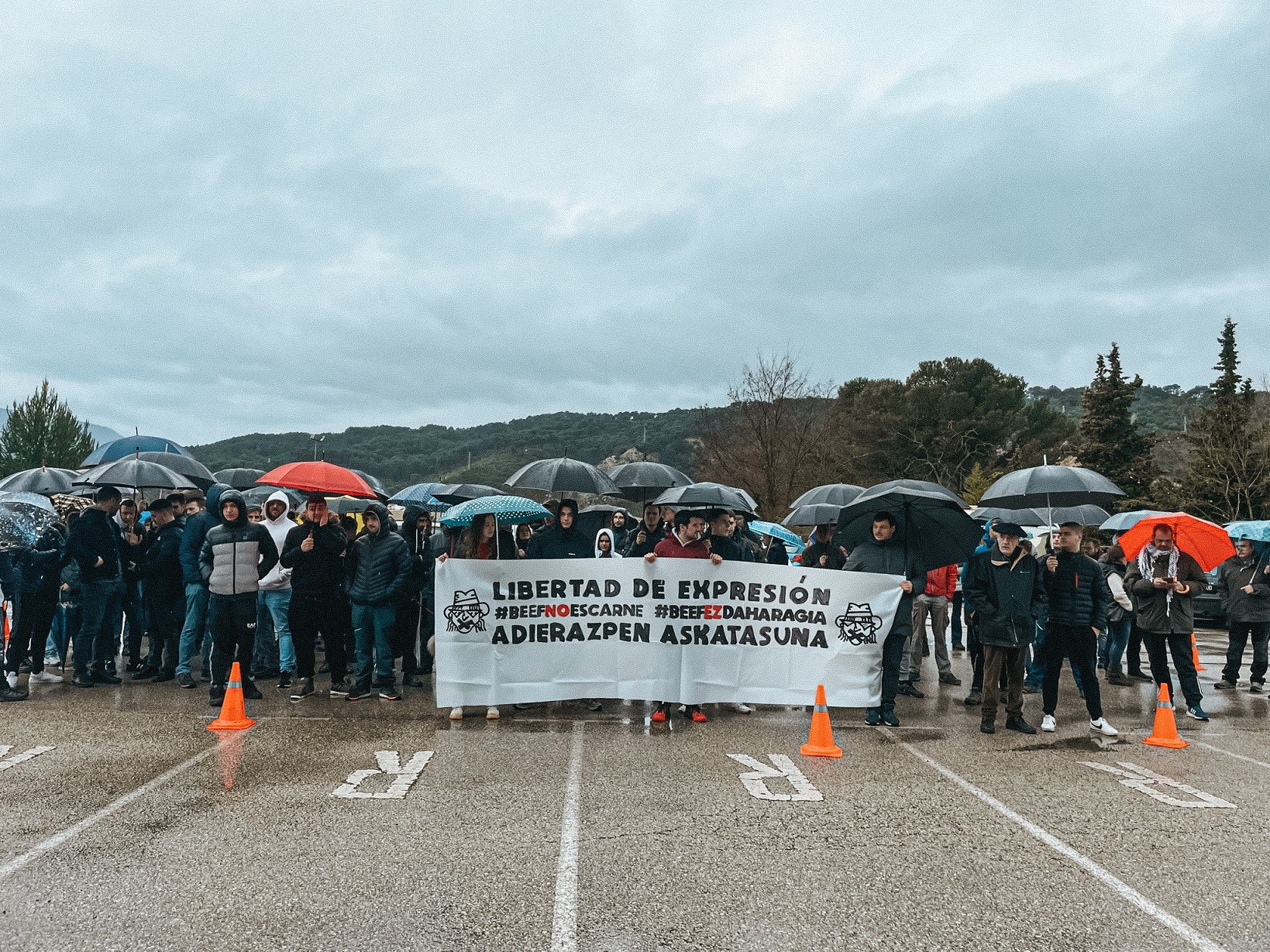"Euskera in Navarre does not serve to achieve decent jobs, but it does create underground things"
- Broken Brothers Brass, conductor of the Band, always loves black music. In recent years he has been working intensively on combining music and community with improvised music and the roots of music in Euskal Herria. The fifth album that they have just published was recorded a year ago and it involves the most important groups of the current musical flowering of the Region of Pamplona.

Jazz musikaria, tronpeta jotzaile eta irakaslea. Donostian eta Iruñean ikasi ondoren Goi Mailako jazz ikasketak egin zituen. Hamar urte zituela Reinhard Renato Valeruz kontrabaxu jotzailearekin inprobisazioa eta jazz musika lantzen hasi zen. Afroamerikar musikarekiko grinak zenbaezinezko grabaketa eta zuzenekoetan parte hartzera eraman du gaztetatik. Amama Luisa, The Foralettes, Lurpekariak eta Eskola Ergatiboa bezalako formazioetan ibili da. Broken Brothers Brass Band taldearen gidaria da eta talde honekin bostgarren diskoa, Katebegia, berriki plazaratu dute. Irakasle lanetan ibili da haur eta nerabeekin hainbat musika eskolatan.Gaur egun klase partikularrak ematen ditu.
What does black music have to be so appealing to you?
A lot of things. All the popular music of the 20th century has its roots in black music, from extreme rock to electronic music. I've always wanted to go to the root and I've always seen that there's black music at the base.
Embedded in anthropological clay, I would say that capitalism cannot be understood without triangular trade and that, at the same time, that trade cannot be understood if millions of Africans had not been kidnapped and brought to America. The cultural manifestations that occur as a result of the pain and collision between cultures explain our world. That's why I'm interested in what's happened in music, and even historically.
On the other hand, I think the idea of community is very important in black music. The canon closest to the pope, for example, the Beatles style, to put it mildly, for me, is pretty closed and individual. In the history of black music, however, it always highlights the importance of being performed in a group. In fact, most of the music in New Orleans can't be recognized by an author. It's popular music. In Western white music, on the contrary, the author's genius acquires great weight. I love black music and at home we have heard a lot of black music ever since.
He started playing in very young public. Did you perform your first concerts with your father?
Yes, at about 12-13 years old. Most of the members of the Amama Luisa Brass Band team were Renato students. Reinhard Renato Valeruz was a pretty special guy. He came here from Austria in the 1970s. He was a double bass player and a lot of jazz fans were moving around. It was very important to me.
This experience of live music has always been very close, so when higher jazz studies were established in the state I chose this way.

The first group you created was The Foralettes. What was it like?
About 20 years ago, we were very engaged in the rhythm and blues and soul styles of the 1950s and 1960s. At that time it was very common to create groups of girl group or girls, and we also wanted to do something like that. We were around six years with this group, but at the same time it was part of other groups. I understand the trade like this. It's an idea that comes from jazz and black music in general. Sometimes we think a group is almost militia. The Rolling Stones isn't that group if they're not the five, but I don't see it that way.
"In the County of Pamplona we need a lot of one thing: to join together. We do not accept ourselves as workers. The situation is so precarious that sometimes we don't know what to do to collect for a concert"
And then Broken Brothers Brass Band?After Renato's death I continued a
few years with Amama Luisa, but it was over. At that time, I was studying at the high-level conservatory and the idea emerged with some colleagues. The group was set up in 2006, but the first album we did in 2012. Recording or not recording for many years wasn't very important to us. It was a learning process.
It's linking black music to tradition here. Is ours also a community music?
Yes. That's it. This conception of community is something that is present in all popular music. Well, in a way, something a people creates to explain to themselves the world, usually anonymously.
I believe that jazz takes the worst vices of Western white music as it enters academia. The easiest thing to teach is to create a canon for others to mimic, but therefore inevitably governs. That is what I think has happened in recent years, and it is particularly contradictory.
At the end of the studies, I felt I couldn't add anything to that canon that I felt, and I preferred to relate to my roots and create new things for the community that I live in. From there came this idea.Entonces I also realized that I didn't know most things about my roots, or just in a very superficial way.
Tradition is something that is always in motion… What I have found in this process is that many of the things that I considered
defining were fossilized at the time when I was born, not before. Our parents have known this crystallization process. Jumps, for example, have had a constant evolution in both the way you play and the way you dance. Baztan's mutil-dantzak, as we know it, is not lost in the night of time. Mauricio Elizalde tells how his father associated a series of jumps to complete the cycle of today’s masculine dances. For me, being aware of this is a lot of fun. For our children, the Sanfermin Txiki ezek is 100% traditional and was created in 2009 by the Duguna Dance Group. The most important thing about this ezains-dantza is not since when it has been, but it has been created precisely to meet a need that we had in Pamplona.
I see folklore and tradition as two almost opposing concepts. For me folklore is that thing that has crystallized. A flower that has given tradition at a given moment and that we must "preserve". Tradition, on the other hand, continuously creates new things. Some remain and others do not, but we have to keep looking for answers.
And from this desire to experience also arise other formations: Submarinists and/or Nerea Erbiti School of Education.
I have the need to try new things. The submarinist was in a very experimental place and it is probably unbearable to listen to this album for most people, but it has borne fruit. From there, and from other experiences of this kind, the new album of Broken and music for the Basque Carnival of Irujo, in Pamplona, has been taken out.
They've been like labs. I consider myself a craftsman and that's why I like to experiment, but for people it's more interesting the result that comes out of there, of course.
There is a lot of talk about the rise in the culture that is taking place in the Region of Pamplona and, above all, of music. Why now, in the Region of Pamplona and in Euskera?
I find it difficult to find concrete answers, but I think it has been a perfect storm. In the Spanish state between seven and eight years ago, the way of making music had been unveiled and I believe that these new ways of doing that have a great connection with black music have spread and have now been developed here. In 2015 and 2016, a handsome musical was being made in Pamplona, but they didn't leave their circles. Now, in addition, the pandemic has increased the need to be together and the movement that came from before has accelerated.
And why in Basque? In the early 2000s, although many of the musicians that were referent to me were Basque, they sang in Spanish or in English and I did the same, perhaps because I had no specific reference in Basque that satisfied me. Now this is changing. In addition, in Navarra the Basque Country has a counter-cultural element that may not have in other places. The Basque country here does not serve to achieve decent employment, but it does do to create things from the underground. We say a kind of slang da.Txantxetan, but it is true that we must thank Euskalaophobia.
Another interesting reason that I think has to do with this is that there are a lot of people who have felt that the path of social democracy is dead. You can't walk around. For a person between the ages of 20 and 22, in adolescence there was a movement so dreamed of by their parents. For the first time the "ours", to put it some way, were in power, but four years later, there's nothing left. So if there's nothing, let's do our thing. Let's organize among us at least to make music or books or whatever we want.

"I see folklore and tradition as two almost opposing concepts. For me folklore is that thing that has crystallized. A flower that has given tradition at a given moment and that we must "preserve". Tradition, on the other hand, continuously creates new things."
Are we Basques the Blacks here?To some
extent, but then there are more Blacks than us, who have even denied being Basques.
In one way or another, we always find you in the midst of the whirlwind of flowering. Are you a dad standing up? What relationship does it have with groups?
What maybe I'm heavy? I have very different relationships with each group, because we have done a lot with each other.
Does it circulate, for example?They have made
me see clearly what my greatest tactical mistake was. I've always been very engaged with black music. My intention was to mass-disseminate black music in Pamplona. Those of Ibilbedi have taught me that it's much more important than what we do to see what we have to do together. I do not listen to white pop with guitar, except for Ibili bedi, and the connection goes beyond music: I am interested in who they are, what they talk about… They have taught me this and they also make very nice songs.
Chill Mafia? The best thing about Chill
Mafia is that everything has been just the beginning. They have a great path of growth, in every sense, and that gives me the joy of Christ.
The relationship comes mainly from Beñat. We have known each other for a long time. It has an amazing musical culture. It's deepened much more than people believe. When they were very young they came to our sessions with reggae music of great interest and our personal relationship began in the collective Iruñerria Jamaica Clash. Ben Yart lived in Mendillorri, in front of our parents.
From there we have always seen it, but it was not related to it. In 2015-2016, I started getting to know her music and flipped. This guy's just doing it so that the songs and the videos are seen by his friends at home. The scene in Mendillorri is very powerful and this is an example of handsome. This Mendillorri movement happened almost at the same time as it happened in Madrid and Barcelona. They were and are far in front. Why has it not happened before in the whole of Pamplona?
Who else would stand out?For me
they are very important in Skabidea, although they do not sit there, as they identify with this movement younger groups than them. We've had a relationship because they love old Jamaican music a lot. They do very good things, and I like that in many things they have another point of view. In addition, I think they have some of the most beautiful letters that have been made in Basque in recent decades. It is a very powerful benchmark for today's young people. When I was 15, I didn't have that, and that gives me a lot of joy.
I have had less to do with Tatxers, but the letters also seem very good to me. Their clarity to explain things gives me envy.
From the head, it's also a very interesting group. Rock in Basque and with accordion. I flipped with the accordionist Asier Capon.Estamos playing in Iruinco and it's terrible.
Amets Aznárez is another errant. He is a trombonist of the Kinbonbo group, now studying in Barcelona and is terrible. This girl goes to another level.
Garazi Petrirena is another great name. Jazz studies and touches every instrument. He studies high-level thrombin, and he's certainly a musician who's going to bring a lot to say.
In Broke you are all boys, in the other groups you are also men the majority. How do you see it?
We talked a lot about this in Broke. When we did the group, for example, there were no girls in high-level jazz studies. It's no coincidence. I think it will come naturally, but I find it very difficult to come up with a solution. In young people, however, I see that something different is already happening. The DJ Sara Goxua has an enormous weight in the Chill Mafia, although she does not want to highlight it. In Kinbonbon there are half and half, the three Black Birds girls who gave way to Skabidean entering, Burutik are also group girls...
Now you see the need to push something forward?
In the region of Pamplona we need one thing: syndication. We do not accept ourselves as workers. The situation is so precarious, that sometimes we don't know what to do to collect for a
concierto.No I know from the music. Some things are needed, but they're happening. You have to keep things humble so that they can stabilize and have replicas in other places.
What do you have to say about the new Katebegia album?
I think it's the most rounded. It seems to me that many of the ideas that have been in the air on previous occasions have materialised in this.
I see that we have made better use of the style and influences of the current groups in New Orleans than ever before, the relationships with tradition and the Basque community seem to me to be very beautiful and I find it incredible how the young people around us have participated. It only comes out in vinyl, but we don't know when. We've now shared it on social media.
LAST WORD
Federal
“We Basques have nothing to do in the battle of big numbers and very spatial things, so let us not waste time and make the effort and work for penetration. Federal thinking is the approach that the Basque Country favours, in my opinion, not nationality. We need small federations working juntas.En decades earlier, music in Euskera has sung a lot to be a people, to the homeland... putting it on a large scale. On the contrary, today's young groups talk about the nearby reality and create a network sharing these issues. So that's what they say local, that in the end it's also universal. It's their strength and it hooks people up."
Azken dantza hau izena du Duplak egin duen aurtengo abestiak eta Senpereko lakuan grabatu zuten bideoklipa. Dantzari, guraso zein umeen artean azaldu ziren Pantxoa eta Peio ere. Bideoklipa laugarrengo saiakeran egin zen.
Duela 150 urte, 1875eko martxoaren 7an jaio zen Maurice Ravel musikagile eta konpositorea, Ziburun. Mundu mailan ospetsu dira haren lanak, bereziki Boleroa. Sarri aipatzen da Parisen bizi izan zela, kontserbatorioan ikasi zuela aro berri bateko irakasleekin, munduko txoko... [+]
Zuloa
Merina gris
Sonido Muchacho, 2025
-------------------------------------------------------
Euskal Herrian ez da orain arte horrelako musika elektronikorik egin. Esango nuke Merina Grisek historian euskaraz egin den elektronika eta hyperpop diskorik landuena egin... [+]
Gazteagotan baino lotsa handiagoa dauka, baina horrek ez dio saltsa askotan ibiltzeko gogoa kentzen Leire Zabalza Santestebani (Iruñea, 1990). Beste gauza askoren artean, Motxila 21 musika taldeko kidea da. Nabarmendu du musika gauza asko aldarrikatzeko bide izan... [+]
Bidai on bat
Braulio
Autoekoizpena, 2024
-----------------------------------------------------
Nik ez nioke talde bati Braulio izena jarriko; eta seguruenik inork gutxik hasiko luke lan bat sei minutuko iraupena duen kanta batekin. Baina hauei parra die eta horri esker... [+]
Hiuzz + Bloñ + Adur
Noiz: otsailaren 15ean.
Non: Iruñeko Aitzina tabernan (Egun Motelak kolektiboa).
--------------------------------------------
Larunbat goiza Iruñean. Neguko eguzkitan lanera doazen gizon –eta ez gizon– bakarti batzuk... [+]
Things aren’t easy in fact, and it will be for one reason or another, but lately I’ve bitten my tongue more than I should for these two things: the culture of the sold out and the FOMO – the latter perhaps has to be explained, because it’s not said so many times: the... [+]
Ultra
La Furia
Baga Biga, 2024
---------------------------------------------------------
Cascanteko La Furia-k bosgarren diskoa plazara atera du. Mimoz eta erraietatik, berarentzat funtsezkoak diren osagai horiekin, prestatu du honako pozima, pozoitsua eta aldi berean... [+]
EMEADEDEI + MAHL KOBAT
WHEN: February 2nd.
IN WHICH: In the youth center of Zuia, Murguía.
----------------------------------------------------
On September 20 of last year, we first heard about collective music in the profile of the social network they had just created:... [+]











